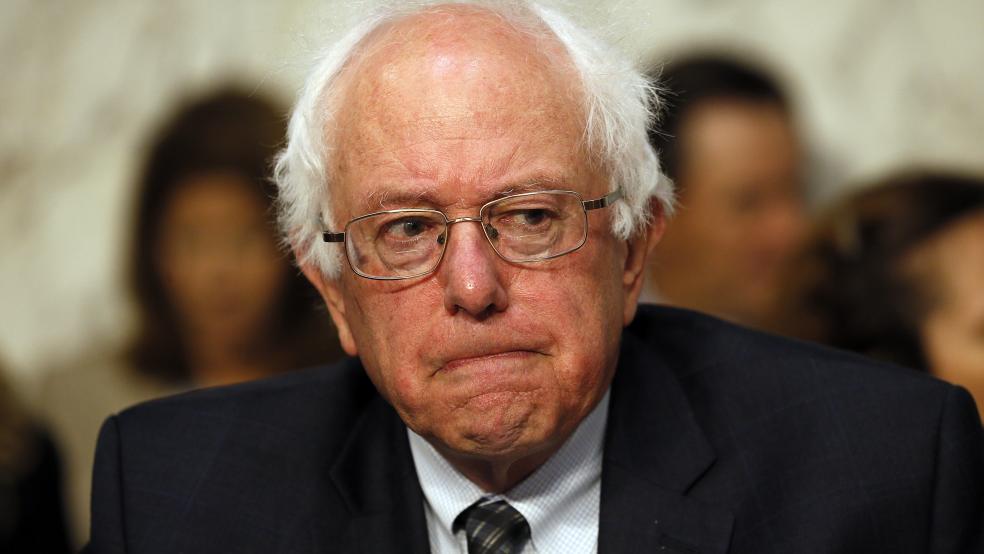Sen. Bernie Sanders of Vermont is suddenly surging as he challenges Hillary Clinton for the 2016 Democratic presidential nomination, with a plethora of events in early battleground states that are drawing lively and enthusiastic crowds.
While Clinton remains the odds-on favorite to win the nomination next year, the 73-year-old Sanders is making a respectable showing in early polling in Iowa and doing even better in New Hampshire, where he currently trails Clinton by just 10 points overall and is tied with her among self-described liberals, according to a new Suffolk University poll.
Related: Sanders Suddenly Is Moving Up on Clinton in New Hampshire
In a campaign speech to hundreds of supporters in Keene, N.H., last month, Sanders declared: “Let me tell you a secret: We’re going to win New Hampshire!”
But some technicalities in state election law may complicate Sanders’ quest for victory in the Granite State. And according to at least one political expert -- former Rep. Charles F. Bass (R-NH) -- Sanders might not even qualify to appear on the ballot.
The problem, Bass says in an op-ed in The Washington Post on Friday, goes to Sanders’ political pedigree. The outspoken liberal and former House member was elected to the Senate in 2006 as an independent and for years has described himself as a socialist. Although he has caucused with the senate Democrats and currently holds the position of the ranking minority member of the Senate Budget Committee, he technically isn’t a registered Democrat.
Because independent or third party candidates for president historically have been unable to qualify to appear on enough state ballots to mount a serious election bid, Sanders said at the time he announced for president that he would run as a Democrat in the 2016 primaries and caucuses.
Related: Sanders Lumps Clinton with Koch Brothers and Adelson
According to Bass, however, Sanders may not qualify for the New Hampshire ballot as a Democrat.
“State law makes clear that candidates must be registered members of the party on whose ballot line they wish to appear,” wrote Bass, a former New Hampshire state senator who chaired the committee with jurisdiction over state election law. “This is a problem for Sanders, who is not a registered Democrat.”
To a layman, this might appear to be a minor bump in the road that could be easily fixed by having Sanders, a former mayor of Burlington, simply change his registration in his home state from independent to Democrat. However, Vermont doesn’t have a party registration system, so he can’t do that, according to Bass. Registered voters express their party preference on election day, when they show up at the polls and ask for either a Democratic or Republican ballot.
Michael Briggs, a spokesman for Sanders, dismissed Bass’s dire warning on Friday, saying there have been plenty of previous situations in which candidates appeared on the New Hampshire primary ballot even though they weren’t technically registered in their homes states as either Democrats or Republicans.
Related: Where Hillary Clinton, Bernie Sanders and Martin O’Malley Stand on the Issues
“Vermont is like about 20 states that have no voter registration,” Briggs explained in a phone interview from Las Vegas, where Sanders is campaigning. “And both George Bushes had no trouble getting on the ballot in New Hampshire even though they were not registered Republicans in their home state of Texas. And Howard Dean got on the ballot in New Hampshire, and he wasn’t a registered Democrat, although he was Democratic governor from Vermont.”
“Bernie has caucused with Democrats ever since he came to Congress,” Brigss added. “And also, when he filed his paperwork with the FEC [Federal Election Commission] creating the campaign committee, Bernie did say on there that he was running in the Democratic Party primaries.”
Not so fast, Bass says. While both George H.W. Bush and George W. Bush were indeed from a state that that doesn’t register voters by party, the Bushes qualified for New Hampshire’s primary ballots because they could show that they had previously appeared on ballots as Republicans. Ditto former Democratic Vice President Al Gore, whose home state of Tennessee did not register voters by party.
Related: U.S. presidential hopeful Sanders: Break up the big banks
When he ran for the Senate, Sanders won the Democratic primary in Vermont, but then declined the nomination and asked that his name not appear on the general election ballot as a Democrat, Bass wrote.
“In short, Sanders is not a Democrat, has not been elected as a Democrat, has never served as a Democrat and cannot plausibly claim, at least in New Hampshire, to be a Democrat,” Bass declared.
Stay tuned. It looks as if this controversy might generate plenty of election lawyer billing hours.
Top Reads From The Fiscal Times:





